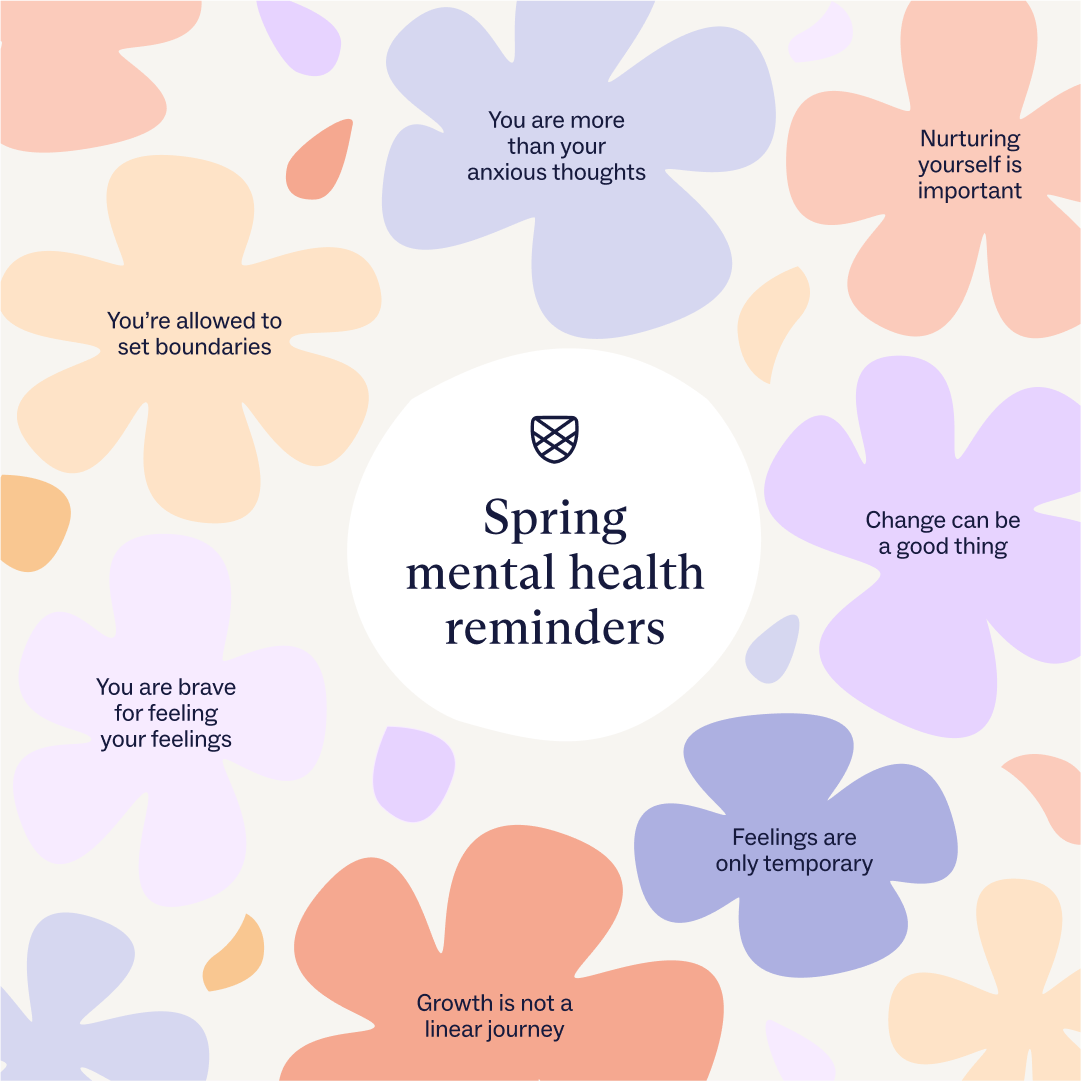
Table of Contents
5 Tips for Maintaining Mental Health During Springtime
Written By: Charlie Health Editorial Team
May 16, 2022
5 min.
The spring season can be a difficult time for those with mental health concerns. Read more for tips on maintaining mental health during this time of year.
Learn more about our Clinical Review Process
Table of Contents
As warmer weather and sunlight-filled days become the norm, many of us are opening our windows to let in the fresh air and celebrate the end of winter. Unfortunately, the spring season isn’t filled with happiness and renewal for everyone. For some, it means the opposite—seasonal depression, a high level of anxiety, and even low energy levels. If you experience mental health issues during the late spring and early summer, it’s essential to prioritize your mental health.
Just like we clean our homes every spring, mental health spring cleaning is just as important. The beginning of spring is always a good time to let go of the mental “clutter” we’re holding on to. Here are some wellness tips for spring for a healthy, productive, and fulfilling spring season.
Do you need more support with
your mental health?
Charlie Health can help.
1. Focus on the present with meditation
If you’re interested in exploring mindfulness, a good place to start is with a daily meditation practice. Meditation has countless misconceptions attached to it, but it’s actually an incredibly useful and practical life skill that can benefit everyone.
Simply put, meditation means giving your total, undivided attention to one thing while remaining in a quiet and calm state for a set amount of time. It can be done while seated, or even lying in bed, at any time of day. In most cases, meditation aims to prevent the mind from drifting to other life stressors. It sounds simple, but we’re so used to having lots of busy thoughts it’s not always easy to push them to the side.
One of the biggest benefits of meditation is that it can help you adapt to changes, helping you focus and deal with stress. As you navigate the transition from the winter months to springtime, practicing meditation can help you cope with stress, negative thoughts, and mood changes.
2. Take a social media detox

The overuse of social media can be harmful to anyone, from young children to older adults. Not only in terms of what you see and what affects you, but how easy it is to be hurtful to other people, compare yourself to others, and strive for perfection. If you find yourself scrolling for hours, it might be time for a social media detox.
Think of what you want more of in your daily routine. This can be anything that’s important to you, whether it’s going for more walks, fitting in more exercise, cooking delicious meals, or spending more time with family members. Once you’ve identified what’s missing in your life, you can start coming up with ways to achieve a healthier balance between scrolling and working toward your goals.
Knowing when to put your phone away, turning on “do not disturb” mode, or closing out of Instagram can make a huge difference in your mental wellness. It can help boost your mood, increase your energy levels, and help you feel more emotionally balanced. Remember: You don’t have to give up Facebook or TikTok entirely. It’s all about finding the right balance and making small, sustainable changes.

3. Let go of your negativity
Holding on to too much negativity in our lives can be mentally draining. By letting go of negative thoughts, we can improve our sense of self and our quality of life.
Start by writing a list of the negative things in your life. Maybe it’s a friend who is often judgmental, a bad habit you constantly berate yourself for, or a view you have about yourself that prevents you from participating in social activities.
Once you’ve created a list, it’s time to remove these negatives from your life. Actively make changes to spend less time with people who don’t make you feel your best, or let them know how their criticism affects you. Consciously adjust your habits and daily routine to replace bad habits with healthier lifestyle choices, and remind yourself that everyone has quirks. For example, if you tend to order takeout after a busy day at work, try prepping meals on your days off instead.
In terms of negative self-talk, ask yourself whether it’s actually making your life better. If the answer is no (which is probably the case for most people), it’s time to let go and embrace what you view as your positive qualities.
4. Remember that it’s OK to say no

Navigating seasonal changes can feel incredibly exhausting. For many people, springtime brings added pressure to socialize and spend time outside. At the same time, the change in seasons can contribute to poor health, exacerbate seasonal allergies, and drive up our stress levels. Sometimes, these mental health challenges can manifest as a mild case of springtime blues, or as a form of seasonal affective disorder (SAD).
If you’re feeling overwhelmed by the new set of expectations that come with spring, remember that it’s OK to say no. You don’t have to say “yes” to every opportunity that comes your way, whether it’s extra work, social activities, or attending events. No is a powerful word, but most of us don’t use it enough.
While it’s great to surround yourself with other people, being too available can take a toll on your mental wellness, forcing you to spread yourself too thin. Sometimes, being assertive might be as simple as saying no to out-of-hours projects or taking a mental health day, especially if you’re showing signs of burnout.
5. Don’t hesitate to reach out for mental health care

Sometimes, springtime can feel overwhelming. This spring season feels heavier than usual as we’re crossing the second anniversary of the COVID-19 pandemic. Two years ago, spring months were filled with panic over the pandemic. Many of us are still processing COVID-19 trauma, which could worsen during the spring season.
Even if you’re not living with a diagnosable mental health condition, it’s important to reach out for help if you need it. Suicidal thoughts, spring anxiety, insomnia, and irritability are all common during the spring as our bodies adjust to more daylight time, changes in our circadian rhythms, and fluctuations in our daily routines.
Contrary to popular belief, you don’t need seasonal depression, bipolar disorder, or another mental illness to experience difficult mental health symptoms during the spring season. Biologically, seasonal changes can be challenging for anyone—and there shouldn’t be any stigma associated with taking care of your mental health.
Contact Us
At Charlie Health, we offer comprehensive mental health treatment for adolescents, young adults, and their family members. Our virtual intensive outpatient program combines individual therapy, supported groups, and family therapy into personalized treatment cohorts based on each client’s needs.
Whether you’re dealing with spring depression, adjusting to seasonal changes after the winter months, or managing springtime mania, we’re here to support you. Our experienced team of mental health professionals will help you develop healthy coping strategies, prioritize your mental wellness, and enjoy the spring season. Get started today.






